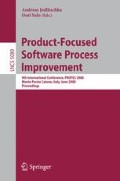Abstract
We have conducted face-to-face questionnaire based interview sessions with twenty-three Malaysian software practitioners in order to determine the perceived value associated with the specific practices of “requirements management”, “process and product quality assurance” and “configuration management” process areas of CMMI level 2 in the stage representation. The objective of this study is to identify the extent to which a CMMI practice is used in order to develop a finer-grained framework, which encompasses the notion of perceived value within specific practices. This will provide software process improvement (SPI) practitioners with some insight into designing appropriate SPI implementation strategies.
We asked practitioners to choose and rank “requirements management”, “process and product quality assurance” and “configuration management” practices against the five types of assessments (high, medium, low, zero or do not know). From this, we propose the notion of ’perceived value’ associated with each practice. We have identified ’high’ and ‘medium’ perceived values CMMI level 2 practices. We have also identified the viewpoints of developers and managers about these practices.
Access this chapter
Tax calculation will be finalised at checkout
Purchases are for personal use only
Preview
Unable to display preview. Download preview PDF.
References
Chrissis, M., Konrad, M., Shrum, S.: CMMI Guidelines for Process Integration and Product Improvement. Addison-Wesley, Reading (2003)
Brodman, J.G., Johnson, D.L.: What Small Businesses and Small Organizations Say About the CMMI. In: Proceedings of 16th International Conference on Software Engineering (ICSE 1994). IEEE Computer Society Press, Los Alamitos (1994)
Batista, J., Dias, d.F.: Software Process Improvement in a Very Small Team: a Case with CMM. Software Process-Improvement and Practice (5), 243–250 (2000)
Paulk, M.: Using the Software CMM in small organizations. In: The Joint 1998 Proceedings of the Pacific Northwest Software Quality Conference and the Eighth International Conference on Software Quality, Portland, pp. 350–361 (1998)
Conradi, R., Fuggetta, A.: Improving Software Process Improvement, July/August (2002), pp. 92–99. IEEE Software (2002)
Wilkie, F.G., McFall, D., McCaffery, F.: An Evaluation of CMMI Process Areas for Small to Medium-sized Software Development Organisations. SOFTWARE PROCESS IMPROVEMENT AND PRACTICE 10, 189–201 (2005)
Niazi, M., Babar, M.: Ali: De-motivators for software process improvement: An Analysis of Vietnamese Practitioners’ Views. In: Münch, J., Abrahamsson, P. (eds.) PROFES 2007. LNCS, vol. 4589, pp. 118–131. Springer, Heidelberg (2007)
Niazi, M., Babar, M.: Ali: Motivators of Software Process Improvement: An Analysis of Vietnamese Practitioners’ Views. In: International Conference on Evaluation and Assessment in Software Engineering (EASE 2007), pp. 79–88 (2007)
Rainer, A., Hall, T.: Key success factors for implementing software process improvement: a maturity-based analysis. Journal of Systems & Software 62(2), 71–84 (2002)
Niazi, M., Wilson, D., Zowghi, D.: A Maturity Model for the Implementation of Software Process Improvement: An empirical study. Journal of Systems and Software 74(2), 155–172 (2005)
Coolican, H.: Research Methods and Statistics in Psychology. Hodder and Stoughton, London (1999)
Trewin and D: Small Business in Australia: 2001. Australian Bureau of Statistics report 1321.0 (2002)
El Emam, K., Madhavji, H.N.: A Field Study of Requirements Engineering Practices in Information Systems Development. In: Second International Symposium on Requirements Engineering, pp. 68–80 (1995)
Standish-Group: Chaos: A Recipe for Success. Standish Group International (1999)
Hall, T., Beecham, S., Rainer, A.: Requirements Problems in Twelve Software Companies: An Empirical Analysis. In: IEE Proceedings - Software, August 2002, pp. 153–160 (2002)
Jobserve.com: UK Wasting Billions on IT Projects (21/4/2004), http://www.jobserve.com/news/NewsStory.asp?e=e&SID=SID2598
Sommerville, I.: Software Engineering, 5th edn. Addison-Wesley, Reading (1996)
Rauterberg, M., Strohm, O.: About the Benefits of User-Oriented Requirements Engineering. In: Proceedings of the First International Workshop on Requirements Engineering: Foundation of Software Quality (REFSQ 1994) (1994)
DeBillis, M., Haapala, C.: User-Centric Software Engineering. IEEE Expert 10(1), 34–41 (1995)
Niazi, M.: An empirical study for the improvement of requirements engineering process. In: The 17th International Conference on Software Engineering and Knowledge Engineering, Taiwan, Republic of China, July 14-16, 2005, pp. 396–399 (2005)
Niazi, M., Shastry, S.: Role of Requirements Engineering in Software development Process: An empirical study. In: IEEE International Multi-Topic Conference (INMIC 2003), pp. 402–407 (2003)
Niazi, M., Cox, K., Verner, J.: An empirical study identifying high perceived value requirements engineering practices. In: Fourteenth International Conference on Information Systems Development (ISD 2005), Karlstad University, Sweden, August 15-17 (2005)
Sommerville, I., Ransom, J.: An empirical study of industrial requirements engineering process assessment and improvement. ACM Transactions on Software Engineering and Methodology 14(1), 85–117 (2005)
Barry, E.J., Mukhopadhyay, T., Slaughter, S.A.: Software Project Duration and Effort: An Empirical Study. Information Technology and Management 3(1-2), 113–136 (2002)
Zowghi, D., Nurmuliani, N.: A study of the impact of requirements volatility on software project performance. In: Ninth Asia-Pacific Software Engineering Conference, pp. 3–11 (2002)
Stark, G., Skillicorn, A., Ameele, R.: An Examination of the Effects of Requirements Changes on Software Maintenance Releases. Journal of Software Maintenance: Research and Practice 11, 293–309 (1999)
Zowghi, D., Nurmuliani, N., Powell, S.: The Impact of Requirements Volatility on Software Development Lifecycle. In: Proceedings of Software Engineering Conference, Australian, pp. 28–37 (2004)
Verner, J., Evanco, W.M.: In-house Software Development: What Software Project Management Practices Lead to Success? IEEE Software 22(1), 86–93 (2005)
Kobitzsch, W., Rombach, D., Feldmann, R.L.: Outsourcing in India. IEEE Software, 78–86 (2001)
Jarvis, A., Crandall, V.: INROADS to software quality. Prentice-Hall, Inc., Englewood Cliffs (1997)
Beecham, S., Hall, T., Rainer, A.: Software Process Problems in Twelve Software Companies: An Empirical Analysis. Empirical software engineering 8, 7–42 (2003)
Niazi, M., Wilson, D., Zowghi, D.: A Framework for Assisting the Design of Effective Software Process Improvement Implementation Strategies. Journal of Systems and Software 78(2), 204–222 (2005)
Author information
Authors and Affiliations
Editor information
Rights and permissions
Copyright information
© 2008 Springer-Verlag Berlin Heidelberg
About this paper
Cite this paper
Niazi, M., Ali Babar, M., Ibrahim, S. (2008). An Empirical Study Identifying High Perceived Value Practices of CMMI Level 2. In: Jedlitschka, A., Salo, O. (eds) Product-Focused Software Process Improvement. PROFES 2008. Lecture Notes in Computer Science, vol 5089. Springer, Berlin, Heidelberg. https://doi.org/10.1007/978-3-540-69566-0_34
Download citation
DOI: https://doi.org/10.1007/978-3-540-69566-0_34
Publisher Name: Springer, Berlin, Heidelberg
Print ISBN: 978-3-540-69564-6
Online ISBN: 978-3-540-69566-0
eBook Packages: Computer ScienceComputer Science (R0)

